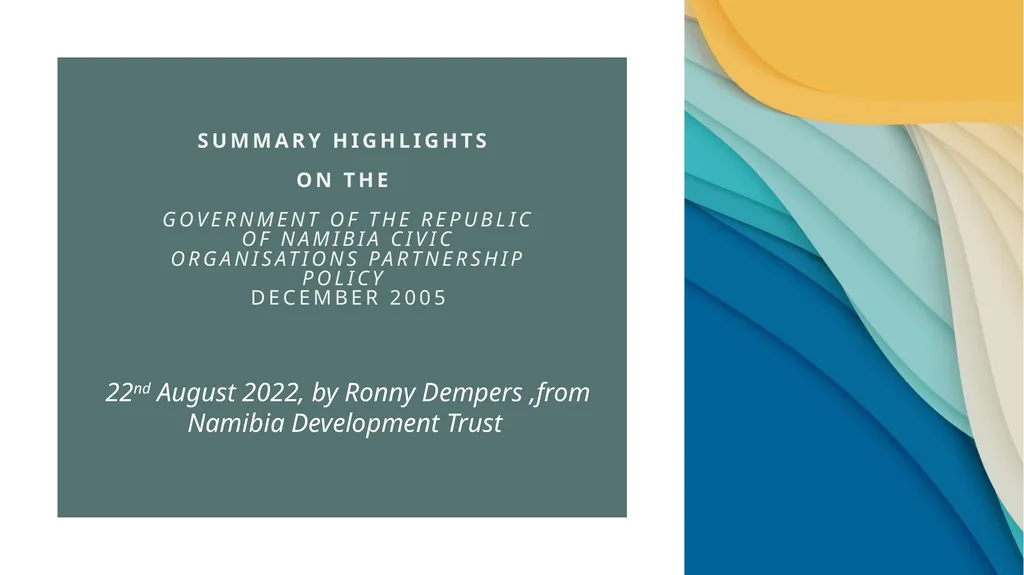Summary Highlights on the GOVERNMENT OF THE
Author : pamella-moone | Published Date : 2025-05-10
Description: Summary Highlights on the GOVERNMENT OF THE REPUBLIC OF NAMIBIA CIVIC ORGANISATIONS PARTNERSHIP POLICY December 2005 22nd August 2022 by Ronny Dempers from Namibia Development Trust WHAT WILL BE COVERED ABOUT THE POLICY Title GOVERNMENT
Presentation Embed Code
Download Presentation
Download
Presentation The PPT/PDF document
"Summary Highlights on the GOVERNMENT OF THE" is the property of its rightful owner.
Permission is granted to download and print the materials on this website for personal, non-commercial use only,
and to display it on your personal computer provided you do not modify the materials and that you retain all
copyright notices contained in the materials. By downloading content from our website, you accept the terms of
this agreement.
Transcript:Summary Highlights on the GOVERNMENT OF THE:
Summary Highlights on the GOVERNMENT OF THE REPUBLIC OF NAMIBIA CIVIC ORGANISATIONS PARTNERSHIP POLICY December 2005 22nd August 2022, by Ronny Dempers ,from Namibia Development Trust WHAT WILL BE COVERED ABOUT THE POLICY Title : GOVERNMENT OF THE REPUBLIC OF NAMIBIA CIVIC ORGANISATIONS PARTNERSHIP POLICY Date adopted : December 2005 by Cabinet Responsible Authority : Office of the President NATIONAL PLANNING COMMISSION HISTORICAL AND CONTEMPORY FACTORS THAT HAVE SHAPED civil society Historical factors The legacy of colonisation and apartheid where many types of civic organisations were banned by the South African Government, and where civic actions were closely monitored, if allowed at all The adoption of western models of civil society, rather than developing models that are based on the search and adaptation of indigenous and African models of civil society. Contemporary Factors The realisation that the Government cannot do it alone and that local and/or sectoral association and organisation can lead to essential development gains. The disinterested attitudes that promote a tendency to leave everything to the Government, rather than take an active role the emergence of civic organisations that once were sympathetic to the governing party, now having become critical of it. the limited avenues for participation in the market economy and the opportunity to access donor funds have provided a potential career avenue for people to form COs, who would otherwise be working in business. the growth in employment opportunities for many Namibians in both the public and private sectors, leaving the non-government sector with a shallow human resource base. CURRENT LEGAL AND REGULATORY ENVIRONMENT Under the current legal and regulatory framework,COs have the option to be registered and operate as: Voluntary Associations (VAs) (under common law) with very few regulatory requirements. All such VAs have to be membership based, and this must be reflected in their constitutions and by-laws. Trusts and Foundations (Trusts Moneys Protection Act No.34 of 1934) where the trust deed is a more formal legal document, which is registered with the Master of High Court. Trusts are never membership organisations, but are governed by a Board of Trustees, appointed by the Trust. Section 21 of Companies Act, No: 28 of 2004 (Companies not for gain, not having a share capital, as part of the Companies Act) where the most formal legal document defines the rights and obligations of members, and more public reporting about the management and finances of the organisation is required.














